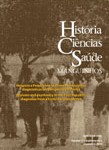February 2018
Infection with the zika virus had a great impact not only on pregnant women and newborns, but also on public health, on popular ideas about Aedes aegypti and with respect to women’s social rights.

Jaime Benchimol, Marcos Cueto, Ilana Löwy, Flávia Bueno; Roberta Cerquera, José Moya and Mónica García.
The current issue of HCSM (vol.24 no.4 Oct./Dec. 2017) features a debate about the zika epidemic, which came to the fore when the disease raised a series of concerns related to its transmission and correlation with microcephaly.
This discussion took place on the occasion of the seminar “Aedes aegypti: past and new health emergencies” held on December 2, 2016, by Casa de Oswaldo Cruz in partnership with the World Health Organization (WHO), the Pan American Health Organization (PAHO), and the Centre for Global Health Histories (University of York, UK).
After the seminar, Marcos Cueto (scientific editor) and Roberta Cerqueira (executive editor) talked to the speakers José Moya (PAHO/WHO) and Mónica García (Universidad del Rosario, Colombia) and the researchers Jaime Benchimol (COC/Fiocruz) , Ilana Löwy (Cermes 3, Paris), and Flávia Bueno (USP, São Paulo) about the history and challenges of Aedes aegypti and zika.
The subjects addressed were related to the following questions: How can the zika and chikungunya epidemics be situated within the historical context of the fight against mosquitos and vectors? What can this epidemics tell us about scientific medical practice and its interface with the so-called lay public? How has the zika epidemic contributed to discussions about abortion in Brazil and Latin America?
See the full article:
Bueno, Flávia Thedim Costa et al. Zika and Aedes aegypti: new and old challenges. Hist. cienc. saude-Manguinhos, Out 2017, vol.24, no.4.
Read about Zika in Manguinhos:
Silva, André Felipe Cândido da and Cueto, Marcos. Health, zika and politics. Hist. cienc. saude-Manguinhos, Out 2017, vol.24, no.4.
Read in our blog:
Zika in the International Relations perspective – According to João Nunes, the discipline of International Relations can contribute to the study of Zika by enabling a more detailed exploration of inequalities at the global level.
Human sciences against zika – Researchers of the international consortium ZIKAlliance gathered at Fiocruz to discuss the social aspects of the disease, such as the effects of campaigns and sexual rights.
Zika, social sciences and humanities – International conference about the role of social sciences in the struggle against Zika. March 30, 2017, ENSP/Fiocruz
Ethics guidance on key issues raised by the Zika outbreak – The document released by the Pan American Health Organization (PAHO) presents recommendations on the domains of healthcare delivery and research.
WHO Zika information resources available online – The WHO website put together information resources about the zika virus.
The fight agains zika in Venezuela – Photographer Manu Quintero documents Zika in Caracas.
Zika virus can cross the placenta at any stage of pregnancy – This recent research analyzed tissues of Brazilian pregnant women. One woman gave birth to a healthy baby despite the presence of the virus in her samples.
Zika virus and rubella: similarities and differences – Researcher Ilana Löwy, from the Institut National de la Sante et de la Recherche Médicale Paris, traces a parallel between the current zika epidemics in Brazil and past rubella outbreaks.
Zika virus spreads across Americas – in pictures – This photo essay published in the Guardian shows different aspects of the Zika virus outbreak in countries such as Brazil, El Salvador, Peru, Colombia, Honduras, Dominican Republic, Paraguay , Nicaragua and Guatemala.







